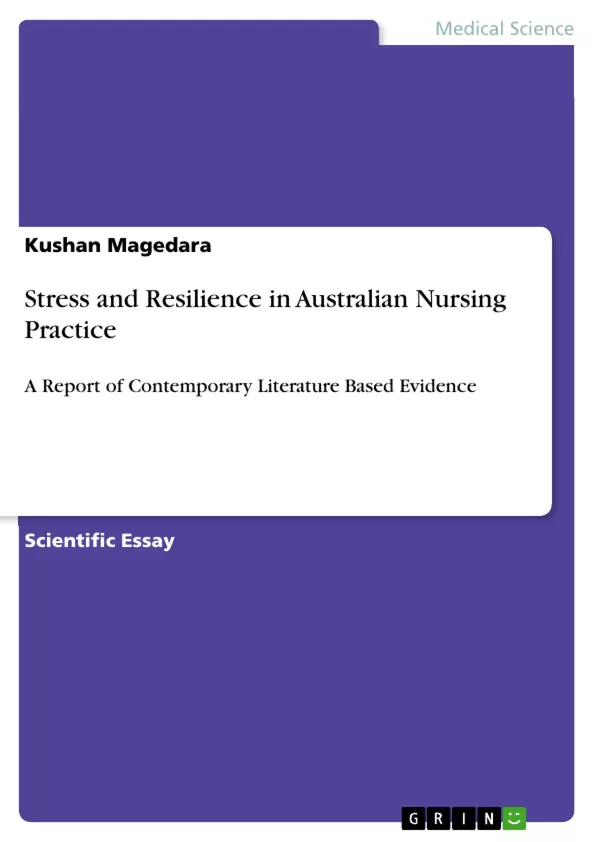The nursing profession is considered a stressful occupation with aggressive patient management, massive workloads, shift work, and high turnover rates. The situation in Australian nursing has been studied comprehensively, although the understanding of stress and resilience is ambiguous. This literature review considers the impact of stressors and coping strategies in Australian nurses.
The aim of this paper is to investigate contemporary and substantial evidence of stress factors, considering the possible coping strategies and its effectiveness in Australian nurses. Therefore, a literature search was conducted in four databases, and a total of six relevant articles were found. The studies identify stress factors and coping strategies in the Australian nursing population.
Inhaltsverzeichnis (Table of Contents)
- BACKGROUND
- IMPLICATIONS OF STRESS
- SEARCH STRATEGY
- LITERATURE OVERVIEW
- Patient Death as a Stress Factor
- Patient Aggression as a Stress Factor
- Multifactorial Stress
- Mindfulness as a Resilience
- Social Support as a Resilience
- Emotional Distance as a Resilience
- DISCUSSION
- CONCLUSION
Zielsetzung und Themenschwerpunkte (Objectives and Key Themes)
This literature review aims to explore contemporary stress factors and potential coping strategies used by Australian nurses. The review focuses on understanding the significant impact of stress on the nursing profession, particularly in Australian settings, and identifies key stressors and their influence on nurses' health and wellbeing. It examines the effectiveness of coping strategies employed by Australian nurses to manage stress and enhance resilience.
- Stress factors in Australian nursing practice
- Coping strategies employed by Australian nurses
- The impact of stress on nurses' physical and psychological health
- The role of resilience in managing stress and promoting wellbeing
- The need for further research to identify effective coping strategies and support mechanisms for Australian nurses
Zusammenfassung der Kapitel (Chapter Summaries)
- BACKGROUND: This chapter provides an overview of the stressful nature of the nursing profession, emphasizing the specific challenges faced by Australian nurses, such as heavy workloads, aggressive patient care, and shift work. It also highlights the need to identify and address stress factors to improve retention rates and address the growing nursing shortage.
- IMPLICATIONS OF STRESS: This chapter delves into the consequences of stress for nurses, exploring concepts such as moral distress and its impact on nurses' mental and physical health. It further examines the relationship between stress and high turnover rates within the nursing profession, discussing the potential consequences for both nurses and patients.
- SEARCH STRATEGY: This chapter outlines the methodology used in conducting the literature review. It details the databases used, keywords employed, and the filtering process applied to arrive at the final selection of relevant articles.
- LITERATURE OVERVIEW: This chapter provides a summary of the key findings from the selected articles, focusing on identified stress factors and coping strategies employed by Australian nurses. Each section highlights the main themes, methods, and limitations of each study, offering insights into the experiences and perspectives of nurses across various states and healthcare settings.
Schlüsselwörter (Keywords)
This literature review focuses on the primary concerns of stress and resilience within the Australian nursing practice. It explores stress factors including patient death, patient aggression, skill deficits, family issues, and patient-related problems. The review also examines coping strategies such as mindfulness, social support, and emotional distance, and explores the role of resilience in overcoming stress and promoting nurses' wellbeing.
- Quote paper
- Kushan Magedara (Author), 2017, Stress and Resilience in Australian Nursing Practice, Munich, GRIN Verlag, https://www.grin.com/document/421185



